#this better have received some kind of literary prize
Text
Talbot Baines Reed: Our Novel. A Summer Holiday Achievement
Chapter One.
The Plot.
It was a bold undertaking, no doubt, at our tender age, to propose to take the world by storm. But others had done it before us.
We had read our Wonderful Boys and our Boyhood of Great Men carefully and critically. We had seen that Mozart had composed music at six, and written it down very untidily too; we had seen that Marlborough had, by sheer cheek, been made an officer at about our age; that David Wilkie, one of the dullest of boys, had painted pictures while at school; that Scott, a notorious blockhead, had written poetry at thirteen; and that James Watt, at the same age, with very little education, had pondered over the spout of a tea-kettle.
All this we had seen, and been very greatly impressed, for surely, if some of these very ordinary boys had succeeded in startling their generation, it would be strange, if we two—Sydney Sproutels and Harry Hullock, who had just carried off the English composition prize at Denhamby—couldn’t write something between us that would make the world “sit up.”
That English composition prize had really been a great feather in our caps. It was the first thing of the kind we had done—not the first English composition, but the first sustained literary effort—and it had opened our eyes to the genius that burned within us.
The exercise had been to expand the following brief anecdote into an interesting narrative which should occupy two pages of Denhamby paper with twenty lines in a page:—
“Orpheus, son of Oeagrus and Calliope, having lost his wife, Eurydice, followed her to Hades, where, by the charm of his music, he received permission to conduct her back to earth, on condition that he should not look behind him during the journey. This condition he broke before Eurydice had quite reached earth, and she was in consequence snatched back into Hades.”
I need not say that two pages of Denhamby paper were all too short to express all we had to say on this delightful subject. I, being by nature a poet, could have used all my space in describing the beauties of the spring morning on which Orpheus made his unusual expedition; while Hullock, whose genius was of a more practical order, confided to me afterwards that if he had had room he had intended to introduce a stirring conversation between the widower and his wife’s ghost, in which the latter would make certain very stringent conditions before consenting to return once more to household duties.
However, by dint of severe self-denial, we both managed to restrain our muses to the forty lines prescribed, and sent in our compositions with quite a feeling of envy for the examiner who would have to read them.
When the results were announced, the doctor publicly stated that “though many of the compositions were meritorious, yet, on the whole, those of Sproutels and Hullock showed most originality, and, indeed, gave considerable promise. The prize would be shared between them.”
Of course, after that, all question as to our calling in life was at an end, and the sooner we “fleshed” our pens before the world the better. So it was arranged that Hullock was to get his father and mother to invite me for the midsummer holidays, and that before Denhamby saw us again, “Our Novel” should be started.
The Hullock family, it is necessary to say here, consisted of my partner, his two parents, a maiden aunt, and a sister. Mr Hullock, a good and worthy little man, who had not had all the advantages of education which his son possessed, was a retired coal merchant, spending the afternoon of his days at Saint Leonards.
His wife, as kind and motherly as she was tall and portly, treated me like her own son from the moment I entered her house.
And with her to look after me, and Alice to fall in love with, and Harry to collaborate with, I was about as comfortable as a restless genius could be—that is, I should have been so had it not been for the damp and frigid influence of Aunt Sarah, who sympathised neither with genius nor youth, and certainly not with the two in combination. Twenty times a day she grieved me by calling me “silly little boy,” and twenty times a day she exasperated me by reminding Harry, and, through him, me, that “little boys should be seen and not heard.”
However, we decided to ignore this uncongenial influence, and bury our sorrows in “Our Novel.”
“Tell you what,” said Harry, as we walked on the pier the first evening, “we ought to look sharp and get our plot.”
“Wouldn’t it be better to settle on the characters and get the plot afterwards?”
“All serene!” said Harry; “can you suggest any one for a hero?”
Harry said this in a half significant, half off-hand manner, which made it evident to me he expected I should at once nominate him.
But, in my judgment, Harry hardly possessed all the qualifications necessary for the hero of our novel. So I replied, half significantly, half off-handedly too—
“Hadn’t you better think of some one?”
Here we were in a fix at the very start. For Harry insisted he would much rather that I should select, and I was equally anxious for him to do it.
At length we compromised the matter and decided we should make the hero a mixture of two fellows—the fellow Harry liked best and the fellow I liked best.
After this amicable arrangement it was comparatively clear sailing. We had not to look far for the heroine, and it occurred to both of us that it would be original as well as pleasant to make the villain a female and middle-aged. As for minor characters, we were able to draw on our acquaintance at Denhamby to supply them, and, failing that, Harry was magnanimous enough to offer his father and mother as “not bad for some of the side plots.”
We had got our characters. That one walk on the pier settled them all. We also stopped a bit to watch the people, we entered into conversation with a sailor (who turned out to be deaf), and insinuated ourselves into the front of a street row, all with a view to reproducing our observations on life into “Our Novel.”
The street row indeed furnished an inspiration for our plot. It was the arrest of a make-believe Italian female organ-grinder, whose offence appeared to be that she was carrying about in a cradle attached to the organ an infant that did not belong to her. And as the infant brought her in much more money than her music did, she protested in very strong English against having it removed.
With the quickness of genius we saw in this incident the pivot on which our novel should be made to turn.
The baby was the heroine, the organ-grinder the villain who had stolen her from her high-born station in life. Two of the characters fitted at a blow! We had even got the high-born parents ready if required, and when sixteen years later the little truant was to discover her noble station, we had our hero ready to take her home!
Between the pier-gate and Warrior Square we had the whole story worked out.
“What has kept you little boys out so late?” asked a voice as we entered Mr Hullock’s hall. “It’s not right. You should have been in bed by eight.”
It was Aunt Sarah! and we secretly condemned her on the spot to a public execution in our last chapter.
As we undressed that evening another point was cleared up.
“We can’t keep the hero hanging about sixteen years before we bring him in,” said Harry.
“Humph,” I observed, “unless we said ‘sixteen years passed’ at the end of the first chapter, and then we might get him in in the second.”
“It strikes me,” said Harry dubiously, “he ought to be in it all through. What do you say to making him another stolen baby belonging to another organ? Just as likely to have two stolen as one.”
It did occur to me that if it came to that, all the characters in the story might begin life in this romantic way. However, there seemed no objection to starting the hero in an organ-grinder’s cradle, and we closed with the suggestion at once and got into bed.
I woke very early. I had the hero on my mind. I wanted him to be a good one after the best model, and I could not help thinking that the Harry in him ought not to be overdone. Besides, if he was to make himself pleasant to the heroine, the less he was like Harry and the more he was like Harry’s chief friend the better. For sisters in fiction never make much of their brothers, but they often make a lot of their brothers’ friends.
I nudged Harry with my elbow, in order to represent the case to him from this point of view. I did it delicately and in a most conciliatory manner.
“I was thinking, old man, as Alice is the heroine and you’re her brother, I might—don’t you know—perhaps you’d like if—well, what I mean to say is, perhaps I’d better do the gush, when it comes to that.”
Happily Harry was scarcely awake, and did not take in all my meaning.
“All serene,” said he, “we’ll have as little of that as we can.”
“I mean I think you’d do the parts about the villain and that sort of thing better—don’t you?”
But as Harry was asleep again I had to take silence for consent.
The day that followed was an anxious one. It is easy enough to get your characters, but it is awful having to fix their names. And it is simple work getting a plot, compared with the agony of dividing it up into forty chapters!
This was the task before us to-day, and we retired as before to the pier-head with pencils and paper, in order to do it beyond the sound of Aunt Sarah’s voice.
We endured agonies over the names. The hero’s name should naturally have been a judicious combination of the names of the two fellows we had in our minds’ eyes. But neither “Sydrey Sproutock” nor “Hardney Hulltels” exactly pleased us. Finally we decided to call him Henry Sydney, and, strange to say, it occurred to me it would be best as a rule to speak of him by his surname, while Harry was equally strong about calling him by his Christian name. At last we agreed that when we, the authors, spoke of him it should be as Sydney, and that when the heroine or any one else mentioned his name it should be as Henry—Harry explaining that “as they’re to be kids together there won’t be anything strange in her calling him by his Christian name.” The heroine, after much searching of heart, we christened Alicia Dearlove, and the villain Sarah Vixen.
The other names we made up from a local directory which we were lucky enough to stumble across in the pavilion.
Then came the formidable work of slicing up our novel into forty pieces. We wrote the figures down the side of a long sheet of paper, and looked with something like dismay at the work we had set before us.
“Seems a lot of chapters,” said Harry; “couldn’t we make it thirty?”
“Wouldn’t run to six shillings if we did,” said I.
That settled it, and we set ourselves to fill up the blanks.
“Chapter the First,” wrote I. “Theft of Alicia—Sorrow of her Parents—The Organ-grinder’s Lodgings—Suspicions of the Police—The Hero in the Room underneath.”
“Hold hard!” cried Harry; “that’s too much for one chapter. We shall have to make that do for four of ’em, or else we shall run out in ten.”
“How on earth can you make four chapters of that?” said I.
“Well, you can make ‘Theft of Alicia’ spin out into one.”
“Oh, ah! Why, all there is to say is that Aunt Sarah—I mean Mother Vixen—came across her in the square and collared her. However are you to make a dozen pages of that?”
“Oh,” said Harry, “we shall have to make her call at public-houses on the way, and that sort of thing, and describe the scenery in the square, and have the nursemaid go off to see the militia band go by, and leave the baby on the seat. Bless you, it’ll spread out!”
Harry seemed to know all about it.
So we went, on with our skeleton, trotting our little foundling round town on the organ, where she witnessed with infant eyes street rows, cricket matches, bicycle races, a murder or two, and such other little incidents of life which we deemed calculated to enliven our story.
About the twelfth chapter she and our hero had already exchanged tender passages.
In the twentieth chapter her real father and mother happen to see her in the street (she being then sixteen), and are immediately struck by her resemblance to their lost baby.
By chapter twenty-five our hero had saved the lives of his future mother and father-in-law, and had rescued the heroine, single-handed, from a Hatton Garden mob.
In the twenty-ninth chapter Aunt Sarah had committed her murder with every circumstance of brutality and unpleasantness, the victim being one of our schoolfellows whom we neither of us loved.
Then for a chapter or two there was some very active police play, interspersed with a few love scenes between the hero and heroine, who—though it never occurred to us at the time—must have enjoyed independent means, which made it quite unnecessary for them to follow the ordinary avocations of organ-grinders.
About the thirty-fifth chapter there was to be a sudden drawing-in of threads from all quarters.
Chapter thirty-sixth was to be devoted to Sarah in the condemned cell.
Thirty-seventh—Alicia discovers her name by seeing it marked on a pocket-handkerchief she had been using at the time she was stolen.
Chapter thirty-eighth—The hero discovers his name by being told it by a solicitor who has known all about it all the time.
Chapter thirty-ninth—All comes right; everybody goes back to their mothers and fathers, and a quiet wedding ensues.
Chapter forty—Execution of Sarah. Finis.
We were tired and hungry by the time our paper was full, but we were jubilant all the same.
“Stunning fine plot!” said Harry. “If we only work it out it ought to be as good as Nicholas Nickleby.”
“Rather! By the way, we ought to have one or two funny chaps in it to work off some of our jokes. There’s that one about the sculptor dying a horrid death, you know—because he makes faces and busts! I’d like to get that in somehow.”
“All serene! That might come in in the last chapters. I’ve got the Family Jest-Book at home; we might pick a few things out of that, and then settle where they come in, and work in for them as we go on.”
We accordingly made a judicious selection, and having marked the initials of the character who was to bring them in against each, and also the number of the chapter in which they were to “come on,” we really felt as if everything was now ready for our venture.
We went to bed early, so as to get a good night and arise fresh to our work, not, however, before we had made an expedition to the stationer’s and expended half a crown in manuscript paper, J and D pens, blotting-paper, blue-black ink, and forty small paper-fasteners.
These provided, and the servant being particularly charged to call us at five o’clock, we retired to rest, and slept with our “skeleton” under the pillow.
Chapter Two.
The Plot Thickens.
A grave question arose the moment we opened our eyes next morning. Who was to write the first chapter? A great deal depended on how it was done. The style of the first chapter would give tone to the whole novel, and, so to speak, show the way for all the other chapters.
“I thought,” said Harry, in his suspicious off-hand way, “if you took the even numbers and I took the odd, that might do.”
Might it? That would mean he would write Chapter One. I wanted to write Chapter One. On the other hand, it would mean I should have Chapter twelve, with the execution in it, which would suit me very well. I mentioned the fact, and could see that Harry had forgotten it, for he tried hard to back out of his arrangement.
“I think you’d do the first chapter best,” said he. “There’s some scenery in it, you know, and you’re more of a dab at that than I am.”
But my modesty preferred the even numbers, and our novel looked very like being water-logged before she had even been launched.
A compromise was, however, arrived at. As the question of style was very important, it was decided we should both write Chapter One, and then, after comparing the two attempts, arrange our further procedure accordingly.
So I with a J pen, and Harry with a D retired to opposite corners of the room and plunged headlong into the “Theft of Alicia.” It was a hard morning’s work, and by the time the breakfast-bell rang we were both getting the steam up. The sight of Aunt Sarah brooding over the tea-tray had but one meaning for us, and Sister Alice’s pretty face and soft voice spoke to me only of that baby I had left in my chapter lying on the seat in the square.
“Now, little boys, are you going to play on the beach to-day?” said the villain, as the meal concluded.
“No, aunt,” said Harry. “Syd and I have got some work we are doing.”
“What work?” demanded Aunt Sarah.
“English composition,” said Harry boldly.
And under cover of this truthful announcement we escaped.
It was midday before I laid down my pen and gathered my scattered sheets together. Harry had been done before me, but he had only written eleven sheets, so our pace was about equal.
“Done?” said he, as I sat back in my chair.
“Yes; lock the door,” said I.
I must beg the reader’s pardon if I do not lay before them the whole of the two lucubrations. They must be content with a few impartially chosen selections.
My chapter began with a poetical description of London in early morning.
“London in the morning! What a scene! The whistle of the workmen’s trains sounds, and the noise of vegetable carts going to Covent Garden Market, give the place an animated appearance. Very few people are awake, and those that are look sleepy.
“In such a scene as this a hideous-looking woman, about fifty years old, with a long nose and a shabby barrel-organ, wended her way from some of the slums near Farringdon Street Station in the direction of Euston Square.
“It was not a very pretty walk. There were no birds twittering in the trees, or cuckoos. You could not hear the gentle roar of the ocean, and what flowers there were, were in pots on the window-sills.
“The ugly woman chose the road where there were most public-houses, and I am sorry to say that any one who had walked close beside her would have heard her talking to herself in very bad language.”
Here followed the description of a few of the public-houses and their natural beauties, and my narrative proceeded—
“In this way the wicked woman reached Euston Square. She was greatly intoxicated, and not able to play the tunes on her organ correctly. Nobody gave her anything, which was not surprising, and the police moved her on all round the square.
“At last it was plain she would have to do something to get some money.
“After thinking over all the different things, she thought she would steal a baby and get money that way. So, seeing a baby lying on a seat close by, whose nurse had gone off to see a militia band marching towards Gower Street, she stole it and went off as fast as she could.
“There was a cradle hanging on to the organ, and when people saw the baby in it the wicked woman got as much money as she liked.
“My reader will have guessed by this time that the baby, which was of the feminine gender, is the heroine.
“She was really high-born.
“Her father was a retired coal merchant. He was a very little man and dropped his h’s.
“Her mother was what the vulgar would call a ‘whopper.’ Let not the reader think she whopped her baby or her husband. On the contrary, she was kind, but big.
“They lived at Highbury, and the nurse always took the baby out for walks before breakfast.”
It was at this point that it had suddenly flashed across me that I had left out the joke allotted to Chapter One, and as the narrative was well advanced, I ought to work up for it without delay. So I proceeded.
“We left Alicia, for that was the name of our heroine, being wheeled back on the organ to Hatton Garden. It was an unpleasant journey. The bad woman called at a lot more public-houses, and left Alicia and the organ outside in the rain.
“It was a wonder Alicia was not stolen again. She began to cry. People who came by couldn’t make out what it was, for she was hidden under the quilt, and some thought instead of an organ it must have been some strange animal.
“An organ that cried like a child would be a very queer animal, nearly as queer as an author whose tale comes out of his head; and some of the people said so.”
I was hot and tired by the time I had worked off this piece of humour, and began to wish I saw my way to the end of my twelve sheets. Two more I occupied with a picture of the organ-grinder’s quarters in Hatton Garden, and concluded with the following poetical passage:—
“Little thought the wicked Vixen as she huddled her stolen infant into a damp corner of the filthy room, how much would happen before Alicia and her poor parents next met.
“We know very little of what is going to happen, and perhaps it is a good job. At any rate it was a good job for Alicia as she lay fast asleep.
“The world is all before the little baby—It doesn’t know what’s all in store for it—If it did know, it seems to me that maybe it wouldn’t like the prospect—not a bit.
“End of Chapter One.”
Harry looked a little uncomfortable as I finished reading my chapter aloud. I concluded he felt rather out of it, and I was not surprised. For on the whole it read well, and in some respects I flattered myself it had rather a pull on Nicholas Nickleby.
Harry wisely reserved his criticisms until he had read his own chapter, which I awaited with a smile of brotherly resignation.
“You know,” explained he, before he began, “I tried to get more incident than you, that’s why I left out the scenery.”
Aha! my scenery had fetched him, then! I wondered what his incident would be like.
“Fire away!” said I.
“Her name was Sarah Vixen—(I’m beginning now)—Her name was Sarah Vixen. She was a horrid old maid. One morning she went and played her organ in Euston Square. She played ‘Wait till the clouds roll by,’ and ‘Sweethearts’ waltz’, and the ‘Marseillaise,’ one after the other, after which she paused and watched a tennis match which was going on in the square.
“It was a four-handed match between two rather good-looking boys who wore red and green ribbons on their straws—(those were the Denhamby colours)—and two big London fellows. The schoolboys won the toss, and the fair one served first. He put in a very hot service just over the net, which broke sharp as it fell, and bothered the Londoners completely. The dark hand-in played close up to the net, and was very neat in the way he picked up balls and smashed them over.”
Harry paused and looked doubtfully at me for a moment, and then went on.
“The schoolboys pulled off the first three games, and then the Londoners scored a game, owing to the wind. A large crowd collected to see the match, and shouts of ‘Well put over!’ greeted the schoolboys on every hand. The Londoners didn’t score another game in the first set, and scored nothing in the second.
“The crowd became thicker and thicker every moment. In the last game the fair schoolboy spun a ball into the far left-hand corner, which the Londoner could not reach, and the match ended in a glorious victory for the two schoolboys, who, apparently unaware of the cheers of the crowd, walked home arm-in-arm as if nothing had happened.
“On their way they met a runaway horse, and loud cries of ‘Take care!’ ‘Get out of the way!’ met them on all sides. A nursemaid was wheeling a child across the road at that moment, and quick as thought the fair boy sprang at the horse and brought him to a standstill just in time. The crowd seeing it, rushed with a great cheer to the young hero, but he seeing it, took his friend’s arm and walked on as if nothing had happened.
“‘What are you so pale for?’ asked his friend.
“‘Oh, nothing very much. I have broken my arm; but it really doesn’t matter much.’
“While he spoke he fainted, and if it had not been for his friend, might have fallen.
“Meanwhile the baby, left to herself in the perambulator in the middle of the road, began to cry, which attracted the notice of Vixen, who, seeing she was a nice child, went and lifted her out of her perambulator, and put her in her cradle on her organ while nobody was looking, and took her to her home.”
“‘Whose home?’ I asked.
Harry did not condescend to notice this interruption. He may have guessed I was jealous. All that about the heroic fair boy had been taking an unfair advantage of me, and I think he knew it. For I was of a dark complexion! His narrative went on to describe a fight in the organ-grinder’s lodgings, and a burglary, followed by a fire at the residence of the parents of the lost child. As a matter of course, the fair boy with his broken arm turned up on the fire-engine, and brought most of the family down the escape with his sound arm. Then by a sudden transition the scene changed back to the organ-grinder’s “cottage,” on the ground floor of which in another cradle slept another infant, a boy, fair, of course, and beautifully made, showing great promise of physical force and heroism of disposition.
“He was older than Alicia, and could speak a little. There was no one in the room, and as he sat up in his cradle he felt very sad. Presently two young organ-grinders came into the room. One was dark and vicious, the other was fair (of course) and had a pleasant expression. They took no notice of the baby, but sat and smoked and asked riddles of one another. The fair one (of course!) was far the cleverer of the two, and caused much laughter by his wit.
“‘Can you tell me,’ said he, in a pleasant silvery voice very unlike an organ-grinder, ‘why an author is a queer animal?’
“‘Give it hup,’ said the vulgar one, who always put his ‘h’s’ wrong.
“‘Because his tale comes out of his head!’
“It was long before the vulgar one saw it, and then he laughed so much that the baby began to cry, and they had to go into the next room for fear of disturbing it. Having left the door open, the fair baby got out of its cradle, and, being old enough to walk, went quietly upstairs, and there what should he see in a cradle in the room above but Alicia! This was the first time the two met. They did not say much, but Cupid’s arrow went through them both from that minute. That’s all,” said Harry.
There was a silence, which at last I broke.
“And which chapter do you think we’d better put in?”
“That’s just what I was going to ask you,” said Harry.
“You see,” said I cautiously, “you’ve got rather a lot about that fair chap in yours, and he’s not in the plot.”
“Oh, he turns out somebody,” said Harry.
“Who?”
“I don’t know yet.”
“He’s not the hero, of course?” said I decisively; “he’s to be a mixture of both.”
“Oh, of course,” said Harry. “But, I say, don’t you think there’s rather too much about scenery in yours? There’s very little of that in Nicholas Nickleby, or poetry either.”
“No; that struck me as one of the weak points of Nicholas Nickleby,” said I.
“I thought it was settled the hero was to be in it from the first?” said Harry, falling back on another line of defence.
“So he is. I shall say in the next chapter that he was in the room underneath all the time,” said I, rather testily.
“Oh, well,” said Harry, “of course if you think yours is the best, you’d better stick it in. I’m out of it, if you’re going in for poetry.”
“You’re not obliged to do any poetry,” said I. “Thanks. I shouldn’t try unless I was sure of writing something that wasn’t doggerel,” said Harry. This was hitting me on a tender point. “Look here,” said I, starting up, “do you mean to tell me I write doggerel?”
“I didn’t say so.”
“You meant it. I’d sooner write doggerel than stuff I’d be ashamed to read in a ‘penny dreadful.’ Call yourself a fair boy!”
Alas for our novel! We spent half an hour that evening in anything but a literary competition.
Aunt Sarah remarked on Harry’s black eye and my one-sided countenance at breakfast next morning, and inquired artlessly if English composition had caused them. We truly answered, “Yes.”
Our friendship was quickly restored; but our poor novel, after that one evening, has never lifted up its head again. We have sometimes vaguely talked of finishing it, but we have been careful to avoid all discussion of details, still less all reference to Chapter One. In fact, we have come to the conclusion that it is better not to startle the world at too early an age. If you do, you are expected to keep it up, and that interferes with your enjoyment of life.
When our Novel does come out, well, we think Conan Doyle, Wells, and those other fellows will sit up.
#fiction#literature#reading#classic#tale of tales#books#short story#short fiction#complete#funny stuff
2 notes
·
View notes
Photo
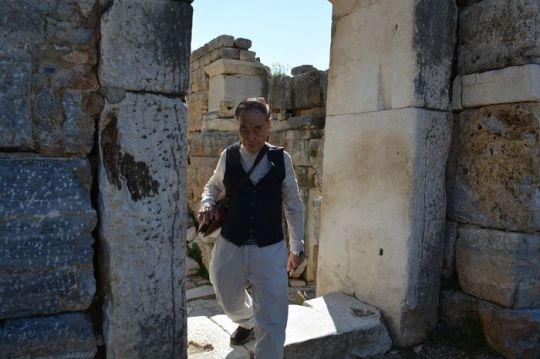
The civilised part of Europe
There were three schools in the place—one for girls and two for boys; and, to judge by the ruins which I saw, they were fine large buildings that no village of the same size, even in the civilised part of Europe, need have been ashamed of. There were six teachers in all—three male and three female; and the number of children that attended the schools was 680, of whom 500 were boys, and 180 girls.
The teachers were well paid—better, I think, everything considered, than they are in England, France, and Germany. The three male teachers and Raika received each sixty pounds a year, a sum which, in this country, where living is cheap, where no great expenditure is required in the way of dress, and in a mountain village far away from railways and telegraphs, was really a very comfortable income.
For a young girl like Raika especially, who had her home, it was a great deal of money. She applied half of it, however, to paying back to the literary society the money spent on her education. She soon became the head mistress of the girls’ school, and as she was the only one of the teachers who was a native of the village, she was a great favourite of the people.
Bulgarians voluntarily
It should be remembered that the schools in Bulgaria are supported by a kind of tax which the Bulgarians voluntarily levy upon themselves ; and the flourishing condition of the schools in one little place like this, and the way in which they were supported, will enable us to form an idea of what they are all over the country, and of the efforts these poor people are making to rise from the grovelling condition in which they have been held for so long. Raika’s position as schoolmistress in a place like Panagurishti was by no means an unenviable one Private Turkey Tours.
A schoolmistress in a place like this is a different sort of personage, it should be remembered, from a schoolmistress in London. With her cleverness, her education, her good looks, the esteem and respect in which she was held by everybody, her position was a very pleasant one, and she was in reality a sort of village queen.
I asked some of the people there if she had no sweet heart all this time, and what had become of him. They said there seemed to be nobody who aspired to her hand, for the reason that she was so far superior to the young men of the place, that they did not dare to hope for such a prize as she would have been. Poor girl; not one of the young men who then thought her so far above them would marry her now.
0 notes
Photo
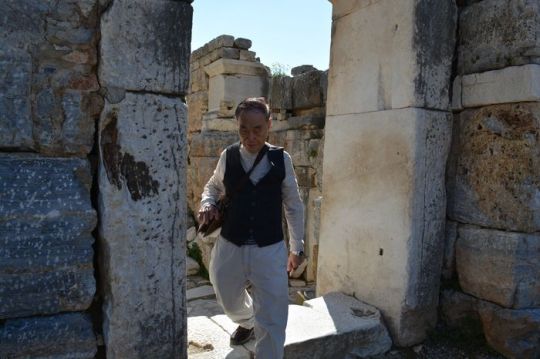
The civilised part of Europe
There were three schools in the place—one for girls and two for boys; and, to judge by the ruins which I saw, they were fine large buildings that no village of the same size, even in the civilised part of Europe, need have been ashamed of. There were six teachers in all—three male and three female; and the number of children that attended the schools was 680, of whom 500 were boys, and 180 girls.
The teachers were well paid—better, I think, everything considered, than they are in England, France, and Germany. The three male teachers and Raika received each sixty pounds a year, a sum which, in this country, where living is cheap, where no great expenditure is required in the way of dress, and in a mountain village far away from railways and telegraphs, was really a very comfortable income.
For a young girl like Raika especially, who had her home, it was a great deal of money. She applied half of it, however, to paying back to the literary society the money spent on her education. She soon became the head mistress of the girls’ school, and as she was the only one of the teachers who was a native of the village, she was a great favourite of the people.
Bulgarians voluntarily
It should be remembered that the schools in Bulgaria are supported by a kind of tax which the Bulgarians voluntarily levy upon themselves ; and the flourishing condition of the schools in one little place like this, and the way in which they were supported, will enable us to form an idea of what they are all over the country, and of the efforts these poor people are making to rise from the grovelling condition in which they have been held for so long. Raika’s position as schoolmistress in a place like Panagurishti was by no means an unenviable one Private Turkey Tours.
A schoolmistress in a place like this is a different sort of personage, it should be remembered, from a schoolmistress in London. With her cleverness, her education, her good looks, the esteem and respect in which she was held by everybody, her position was a very pleasant one, and she was in reality a sort of village queen.
I asked some of the people there if she had no sweet heart all this time, and what had become of him. They said there seemed to be nobody who aspired to her hand, for the reason that she was so far superior to the young men of the place, that they did not dare to hope for such a prize as she would have been. Poor girl; not one of the young men who then thought her so far above them would marry her now.
0 notes
Photo
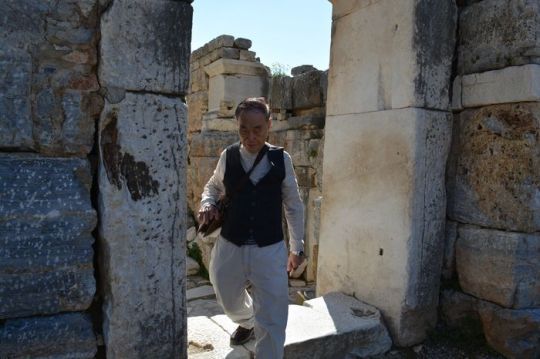
The civilised part of Europe
There were three schools in the place—one for girls and two for boys; and, to judge by the ruins which I saw, they were fine large buildings that no village of the same size, even in the civilised part of Europe, need have been ashamed of. There were six teachers in all—three male and three female; and the number of children that attended the schools was 680, of whom 500 were boys, and 180 girls.
The teachers were well paid—better, I think, everything considered, than they are in England, France, and Germany. The three male teachers and Raika received each sixty pounds a year, a sum which, in this country, where living is cheap, where no great expenditure is required in the way of dress, and in a mountain village far away from railways and telegraphs, was really a very comfortable income.
For a young girl like Raika especially, who had her home, it was a great deal of money. She applied half of it, however, to paying back to the literary society the money spent on her education. She soon became the head mistress of the girls’ school, and as she was the only one of the teachers who was a native of the village, she was a great favourite of the people.
Bulgarians voluntarily
It should be remembered that the schools in Bulgaria are supported by a kind of tax which the Bulgarians voluntarily levy upon themselves ; and the flourishing condition of the schools in one little place like this, and the way in which they were supported, will enable us to form an idea of what they are all over the country, and of the efforts these poor people are making to rise from the grovelling condition in which they have been held for so long. Raika’s position as schoolmistress in a place like Panagurishti was by no means an unenviable one Private Turkey Tours.
A schoolmistress in a place like this is a different sort of personage, it should be remembered, from a schoolmistress in London. With her cleverness, her education, her good looks, the esteem and respect in which she was held by everybody, her position was a very pleasant one, and she was in reality a sort of village queen.
I asked some of the people there if she had no sweet heart all this time, and what had become of him. They said there seemed to be nobody who aspired to her hand, for the reason that she was so far superior to the young men of the place, that they did not dare to hope for such a prize as she would have been. Poor girl; not one of the young men who then thought her so far above them would marry her now.
0 notes
Photo
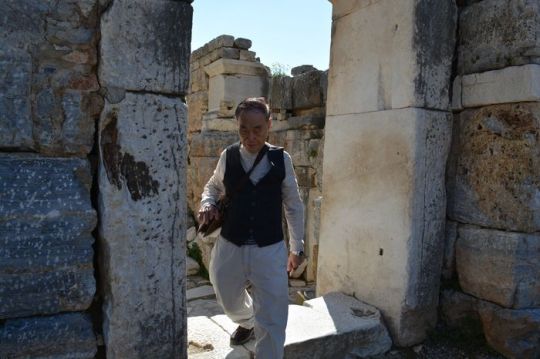
The civilised part of Europe
There were three schools in the place—one for girls and two for boys; and, to judge by the ruins which I saw, they were fine large buildings that no village of the same size, even in the civilised part of Europe, need have been ashamed of. There were six teachers in all—three male and three female; and the number of children that attended the schools was 680, of whom 500 were boys, and 180 girls.
The teachers were well paid—better, I think, everything considered, than they are in England, France, and Germany. The three male teachers and Raika received each sixty pounds a year, a sum which, in this country, where living is cheap, where no great expenditure is required in the way of dress, and in a mountain village far away from railways and telegraphs, was really a very comfortable income.
For a young girl like Raika especially, who had her home, it was a great deal of money. She applied half of it, however, to paying back to the literary society the money spent on her education. She soon became the head mistress of the girls’ school, and as she was the only one of the teachers who was a native of the village, she was a great favourite of the people.
Bulgarians voluntarily
It should be remembered that the schools in Bulgaria are supported by a kind of tax which the Bulgarians voluntarily levy upon themselves ; and the flourishing condition of the schools in one little place like this, and the way in which they were supported, will enable us to form an idea of what they are all over the country, and of the efforts these poor people are making to rise from the grovelling condition in which they have been held for so long. Raika’s position as schoolmistress in a place like Panagurishti was by no means an unenviable one Private Turkey Tours.
A schoolmistress in a place like this is a different sort of personage, it should be remembered, from a schoolmistress in London. With her cleverness, her education, her good looks, the esteem and respect in which she was held by everybody, her position was a very pleasant one, and she was in reality a sort of village queen.
I asked some of the people there if she had no sweet heart all this time, and what had become of him. They said there seemed to be nobody who aspired to her hand, for the reason that she was so far superior to the young men of the place, that they did not dare to hope for such a prize as she would have been. Poor girl; not one of the young men who then thought her so far above them would marry her now.
0 notes
Photo
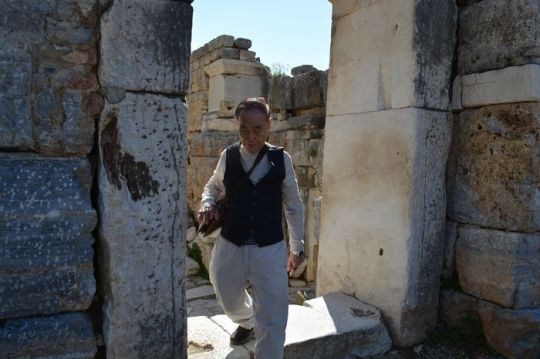
The civilised part of Europe
There were three schools in the place—one for girls and two for boys; and, to judge by the ruins which I saw, they were fine large buildings that no village of the same size, even in the civilised part of Europe, need have been ashamed of. There were six teachers in all—three male and three female; and the number of children that attended the schools was 680, of whom 500 were boys, and 180 girls.
The teachers were well paid—better, I think, everything considered, than they are in England, France, and Germany. The three male teachers and Raika received each sixty pounds a year, a sum which, in this country, where living is cheap, where no great expenditure is required in the way of dress, and in a mountain village far away from railways and telegraphs, was really a very comfortable income.
For a young girl like Raika especially, who had her home, it was a great deal of money. She applied half of it, however, to paying back to the literary society the money spent on her education. She soon became the head mistress of the girls’ school, and as she was the only one of the teachers who was a native of the village, she was a great favourite of the people.
Bulgarians voluntarily
It should be remembered that the schools in Bulgaria are supported by a kind of tax which the Bulgarians voluntarily levy upon themselves ; and the flourishing condition of the schools in one little place like this, and the way in which they were supported, will enable us to form an idea of what they are all over the country, and of the efforts these poor people are making to rise from the grovelling condition in which they have been held for so long. Raika’s position as schoolmistress in a place like Panagurishti was by no means an unenviable one Private Turkey Tours.
A schoolmistress in a place like this is a different sort of personage, it should be remembered, from a schoolmistress in London. With her cleverness, her education, her good looks, the esteem and respect in which she was held by everybody, her position was a very pleasant one, and she was in reality a sort of village queen.
I asked some of the people there if she had no sweet heart all this time, and what had become of him. They said there seemed to be nobody who aspired to her hand, for the reason that she was so far superior to the young men of the place, that they did not dare to hope for such a prize as she would have been. Poor girl; not one of the young men who then thought her so far above them would marry her now.
0 notes
Photo
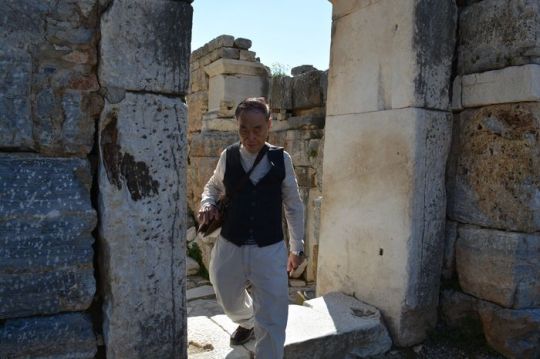
The civilised part of Europe
There were three schools in the place—one for girls and two for boys; and, to judge by the ruins which I saw, they were fine large buildings that no village of the same size, even in the civilised part of Europe, need have been ashamed of. There were six teachers in all—three male and three female; and the number of children that attended the schools was 680, of whom 500 were boys, and 180 girls.
The teachers were well paid—better, I think, everything considered, than they are in England, France, and Germany. The three male teachers and Raika received each sixty pounds a year, a sum which, in this country, where living is cheap, where no great expenditure is required in the way of dress, and in a mountain village far away from railways and telegraphs, was really a very comfortable income.
For a young girl like Raika especially, who had her home, it was a great deal of money. She applied half of it, however, to paying back to the literary society the money spent on her education. She soon became the head mistress of the girls’ school, and as she was the only one of the teachers who was a native of the village, she was a great favourite of the people.
Bulgarians voluntarily
It should be remembered that the schools in Bulgaria are supported by a kind of tax which the Bulgarians voluntarily levy upon themselves ; and the flourishing condition of the schools in one little place like this, and the way in which they were supported, will enable us to form an idea of what they are all over the country, and of the efforts these poor people are making to rise from the grovelling condition in which they have been held for so long. Raika’s position as schoolmistress in a place like Panagurishti was by no means an unenviable one Private Turkey Tours.
A schoolmistress in a place like this is a different sort of personage, it should be remembered, from a schoolmistress in London. With her cleverness, her education, her good looks, the esteem and respect in which she was held by everybody, her position was a very pleasant one, and she was in reality a sort of village queen.
I asked some of the people there if she had no sweet heart all this time, and what had become of him. They said there seemed to be nobody who aspired to her hand, for the reason that she was so far superior to the young men of the place, that they did not dare to hope for such a prize as she would have been. Poor girl; not one of the young men who then thought her so far above them would marry her now.
0 notes
Photo
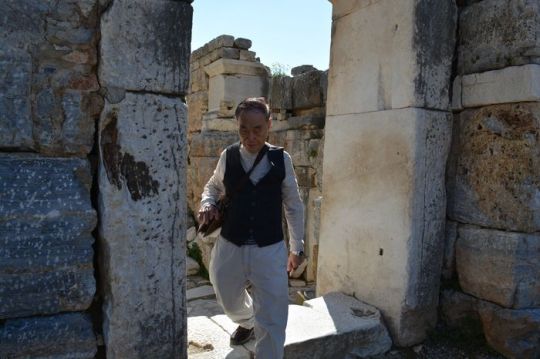
The civilised part of Europe
There were three schools in the place—one for girls and two for boys; and, to judge by the ruins which I saw, they were fine large buildings that no village of the same size, even in the civilised part of Europe, need have been ashamed of. There were six teachers in all—three male and three female; and the number of children that attended the schools was 680, of whom 500 were boys, and 180 girls.
The teachers were well paid—better, I think, everything considered, than they are in England, France, and Germany. The three male teachers and Raika received each sixty pounds a year, a sum which, in this country, where living is cheap, where no great expenditure is required in the way of dress, and in a mountain village far away from railways and telegraphs, was really a very comfortable income.
For a young girl like Raika especially, who had her home, it was a great deal of money. She applied half of it, however, to paying back to the literary society the money spent on her education. She soon became the head mistress of the girls’ school, and as she was the only one of the teachers who was a native of the village, she was a great favourite of the people.
Bulgarians voluntarily
It should be remembered that the schools in Bulgaria are supported by a kind of tax which the Bulgarians voluntarily levy upon themselves ; and the flourishing condition of the schools in one little place like this, and the way in which they were supported, will enable us to form an idea of what they are all over the country, and of the efforts these poor people are making to rise from the grovelling condition in which they have been held for so long. Raika’s position as schoolmistress in a place like Panagurishti was by no means an unenviable one Private Turkey Tours.
A schoolmistress in a place like this is a different sort of personage, it should be remembered, from a schoolmistress in London. With her cleverness, her education, her good looks, the esteem and respect in which she was held by everybody, her position was a very pleasant one, and she was in reality a sort of village queen.
I asked some of the people there if she had no sweet heart all this time, and what had become of him. They said there seemed to be nobody who aspired to her hand, for the reason that she was so far superior to the young men of the place, that they did not dare to hope for such a prize as she would have been. Poor girl; not one of the young men who then thought her so far above them would marry her now.
0 notes
Photo
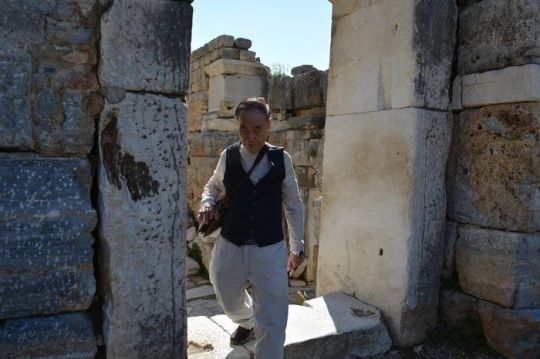
The civilised part of Europe
There were three schools in the place—one for girls and two for boys; and, to judge by the ruins which I saw, they were fine large buildings that no village of the same size, even in the civilised part of Europe, need have been ashamed of. There were six teachers in all—three male and three female; and the number of children that attended the schools was 680, of whom 500 were boys, and 180 girls.
The teachers were well paid—better, I think, everything considered, than they are in England, France, and Germany. The three male teachers and Raika received each sixty pounds a year, a sum which, in this country, where living is cheap, where no great expenditure is required in the way of dress, and in a mountain village far away from railways and telegraphs, was really a very comfortable income.
For a young girl like Raika especially, who had her home, it was a great deal of money. She applied half of it, however, to paying back to the literary society the money spent on her education. She soon became the head mistress of the girls’ school, and as she was the only one of the teachers who was a native of the village, she was a great favourite of the people.
Bulgarians voluntarily
It should be remembered that the schools in Bulgaria are supported by a kind of tax which the Bulgarians voluntarily levy upon themselves ; and the flourishing condition of the schools in one little place like this, and the way in which they were supported, will enable us to form an idea of what they are all over the country, and of the efforts these poor people are making to rise from the grovelling condition in which they have been held for so long. Raika’s position as schoolmistress in a place like Panagurishti was by no means an unenviable one Private Turkey Tours.
A schoolmistress in a place like this is a different sort of personage, it should be remembered, from a schoolmistress in London. With her cleverness, her education, her good looks, the esteem and respect in which she was held by everybody, her position was a very pleasant one, and she was in reality a sort of village queen.
I asked some of the people there if she had no sweet heart all this time, and what had become of him. They said there seemed to be nobody who aspired to her hand, for the reason that she was so far superior to the young men of the place, that they did not dare to hope for such a prize as she would have been. Poor girl; not one of the young men who then thought her so far above them would marry her now.
0 notes
Photo
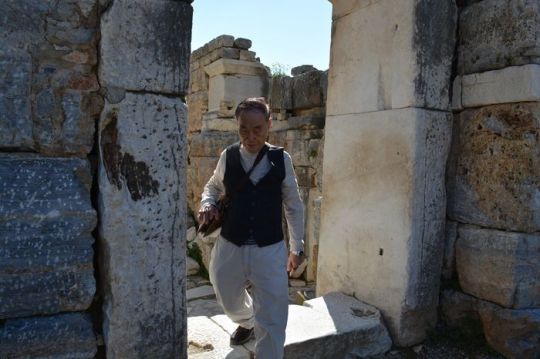
The civilised part of Europe
There were three schools in the place—one for girls and two for boys; and, to judge by the ruins which I saw, they were fine large buildings that no village of the same size, even in the civilised part of Europe, need have been ashamed of. There were six teachers in all—three male and three female; and the number of children that attended the schools was 680, of whom 500 were boys, and 180 girls.
The teachers were well paid—better, I think, everything considered, than they are in England, France, and Germany. The three male teachers and Raika received each sixty pounds a year, a sum which, in this country, where living is cheap, where no great expenditure is required in the way of dress, and in a mountain village far away from railways and telegraphs, was really a very comfortable income.
For a young girl like Raika especially, who had her home, it was a great deal of money. She applied half of it, however, to paying back to the literary society the money spent on her education. She soon became the head mistress of the girls’ school, and as she was the only one of the teachers who was a native of the village, she was a great favourite of the people.
Bulgarians voluntarily
It should be remembered that the schools in Bulgaria are supported by a kind of tax which the Bulgarians voluntarily levy upon themselves ; and the flourishing condition of the schools in one little place like this, and the way in which they were supported, will enable us to form an idea of what they are all over the country, and of the efforts these poor people are making to rise from the grovelling condition in which they have been held for so long. Raika’s position as schoolmistress in a place like Panagurishti was by no means an unenviable one Private Turkey Tours.
A schoolmistress in a place like this is a different sort of personage, it should be remembered, from a schoolmistress in London. With her cleverness, her education, her good looks, the esteem and respect in which she was held by everybody, her position was a very pleasant one, and she was in reality a sort of village queen.
I asked some of the people there if she had no sweet heart all this time, and what had become of him. They said there seemed to be nobody who aspired to her hand, for the reason that she was so far superior to the young men of the place, that they did not dare to hope for such a prize as she would have been. Poor girl; not one of the young men who then thought her so far above them would marry her now.
0 notes
Photo
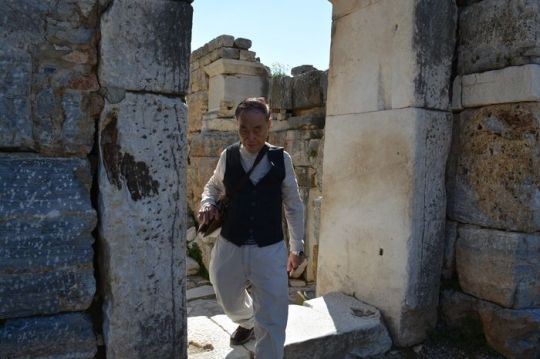
The civilised part of Europe
There were three schools in the place—one for girls and two for boys; and, to judge by the ruins which I saw, they were fine large buildings that no village of the same size, even in the civilised part of Europe, need have been ashamed of. There were six teachers in all—three male and three female; and the number of children that attended the schools was 680, of whom 500 were boys, and 180 girls.
The teachers were well paid—better, I think, everything considered, than they are in England, France, and Germany. The three male teachers and Raika received each sixty pounds a year, a sum which, in this country, where living is cheap, where no great expenditure is required in the way of dress, and in a mountain village far away from railways and telegraphs, was really a very comfortable income.
For a young girl like Raika especially, who had her home, it was a great deal of money. She applied half of it, however, to paying back to the literary society the money spent on her education. She soon became the head mistress of the girls’ school, and as she was the only one of the teachers who was a native of the village, she was a great favourite of the people.
Bulgarians voluntarily
It should be remembered that the schools in Bulgaria are supported by a kind of tax which the Bulgarians voluntarily levy upon themselves ; and the flourishing condition of the schools in one little place like this, and the way in which they were supported, will enable us to form an idea of what they are all over the country, and of the efforts these poor people are making to rise from the grovelling condition in which they have been held for so long. Raika’s position as schoolmistress in a place like Panagurishti was by no means an unenviable one Private Turkey Tours.
A schoolmistress in a place like this is a different sort of personage, it should be remembered, from a schoolmistress in London. With her cleverness, her education, her good looks, the esteem and respect in which she was held by everybody, her position was a very pleasant one, and she was in reality a sort of village queen.
I asked some of the people there if she had no sweet heart all this time, and what had become of him. They said there seemed to be nobody who aspired to her hand, for the reason that she was so far superior to the young men of the place, that they did not dare to hope for such a prize as she would have been. Poor girl; not one of the young men who then thought her so far above them would marry her now.
0 notes
Photo
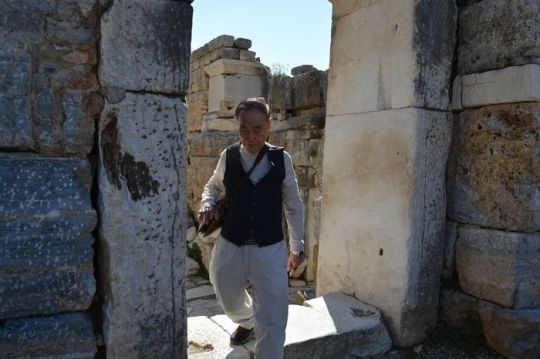
The civilised part of Europe
There were three schools in the place—one for girls and two for boys; and, to judge by the ruins which I saw, they were fine large buildings that no village of the same size, even in the civilised part of Europe, need have been ashamed of. There were six teachers in all—three male and three female; and the number of children that attended the schools was 680, of whom 500 were boys, and 180 girls.
The teachers were well paid—better, I think, everything considered, than they are in England, France, and Germany. The three male teachers and Raika received each sixty pounds a year, a sum which, in this country, where living is cheap, where no great expenditure is required in the way of dress, and in a mountain village far away from railways and telegraphs, was really a very comfortable income.
For a young girl like Raika especially, who had her home, it was a great deal of money. She applied half of it, however, to paying back to the literary society the money spent on her education. She soon became the head mistress of the girls’ school, and as she was the only one of the teachers who was a native of the village, she was a great favourite of the people.
Bulgarians voluntarily
It should be remembered that the schools in Bulgaria are supported by a kind of tax which the Bulgarians voluntarily levy upon themselves ; and the flourishing condition of the schools in one little place like this, and the way in which they were supported, will enable us to form an idea of what they are all over the country, and of the efforts these poor people are making to rise from the grovelling condition in which they have been held for so long. Raika’s position as schoolmistress in a place like Panagurishti was by no means an unenviable one Private Turkey Tours.
A schoolmistress in a place like this is a different sort of personage, it should be remembered, from a schoolmistress in London. With her cleverness, her education, her good looks, the esteem and respect in which she was held by everybody, her position was a very pleasant one, and she was in reality a sort of village queen.
I asked some of the people there if she had no sweet heart all this time, and what had become of him. They said there seemed to be nobody who aspired to her hand, for the reason that she was so far superior to the young men of the place, that they did not dare to hope for such a prize as she would have been. Poor girl; not one of the young men who then thought her so far above them would marry her now.
0 notes
Photo
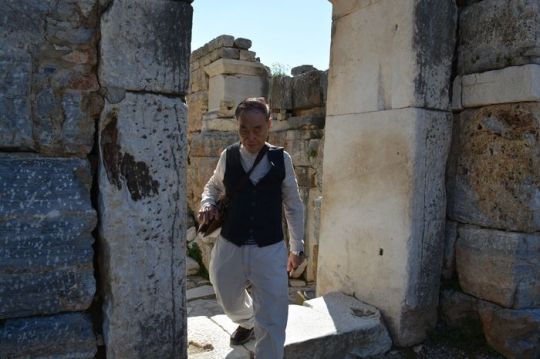
The civilised part of Europe
There were three schools in the place—one for girls and two for boys; and, to judge by the ruins which I saw, they were fine large buildings that no village of the same size, even in the civilised part of Europe, need have been ashamed of. There were six teachers in all—three male and three female; and the number of children that attended the schools was 680, of whom 500 were boys, and 180 girls.
The teachers were well paid—better, I think, everything considered, than they are in England, France, and Germany. The three male teachers and Raika received each sixty pounds a year, a sum which, in this country, where living is cheap, where no great expenditure is required in the way of dress, and in a mountain village far away from railways and telegraphs, was really a very comfortable income.
For a young girl like Raika especially, who had her home, it was a great deal of money. She applied half of it, however, to paying back to the literary society the money spent on her education. She soon became the head mistress of the girls’ school, and as she was the only one of the teachers who was a native of the village, she was a great favourite of the people.
Bulgarians voluntarily
It should be remembered that the schools in Bulgaria are supported by a kind of tax which the Bulgarians voluntarily levy upon themselves ; and the flourishing condition of the schools in one little place like this, and the way in which they were supported, will enable us to form an idea of what they are all over the country, and of the efforts these poor people are making to rise from the grovelling condition in which they have been held for so long. Raika’s position as schoolmistress in a place like Panagurishti was by no means an unenviable one Private Turkey Tours.
A schoolmistress in a place like this is a different sort of personage, it should be remembered, from a schoolmistress in London. With her cleverness, her education, her good looks, the esteem and respect in which she was held by everybody, her position was a very pleasant one, and she was in reality a sort of village queen.
I asked some of the people there if she had no sweet heart all this time, and what had become of him. They said there seemed to be nobody who aspired to her hand, for the reason that she was so far superior to the young men of the place, that they did not dare to hope for such a prize as she would have been. Poor girl; not one of the young men who then thought her so far above them would marry her now.
0 notes
Photo
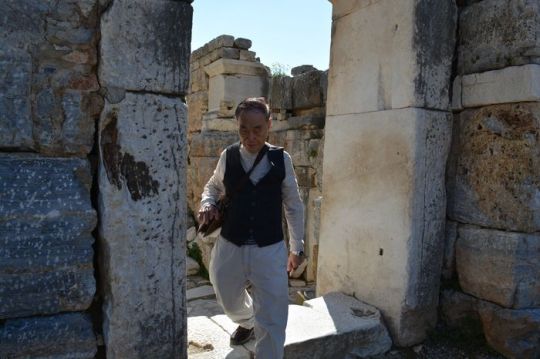
The civilised part of Europe
There were three schools in the place—one for girls and two for boys; and, to judge by the ruins which I saw, they were fine large buildings that no village of the same size, even in the civilised part of Europe, need have been ashamed of. There were six teachers in all—three male and three female; and the number of children that attended the schools was 680, of whom 500 were boys, and 180 girls.
The teachers were well paid—better, I think, everything considered, than they are in England, France, and Germany. The three male teachers and Raika received each sixty pounds a year, a sum which, in this country, where living is cheap, where no great expenditure is required in the way of dress, and in a mountain village far away from railways and telegraphs, was really a very comfortable income.
For a young girl like Raika especially, who had her home, it was a great deal of money. She applied half of it, however, to paying back to the literary society the money spent on her education. She soon became the head mistress of the girls’ school, and as she was the only one of the teachers who was a native of the village, she was a great favourite of the people.
Bulgarians voluntarily
It should be remembered that the schools in Bulgaria are supported by a kind of tax which the Bulgarians voluntarily levy upon themselves ; and the flourishing condition of the schools in one little place like this, and the way in which they were supported, will enable us to form an idea of what they are all over the country, and of the efforts these poor people are making to rise from the grovelling condition in which they have been held for so long. Raika’s position as schoolmistress in a place like Panagurishti was by no means an unenviable one Private Turkey Tours.
A schoolmistress in a place like this is a different sort of personage, it should be remembered, from a schoolmistress in London. With her cleverness, her education, her good looks, the esteem and respect in which she was held by everybody, her position was a very pleasant one, and she was in reality a sort of village queen.
I asked some of the people there if she had no sweet heart all this time, and what had become of him. They said there seemed to be nobody who aspired to her hand, for the reason that she was so far superior to the young men of the place, that they did not dare to hope for such a prize as she would have been. Poor girl; not one of the young men who then thought her so far above them would marry her now.
0 notes
Photo
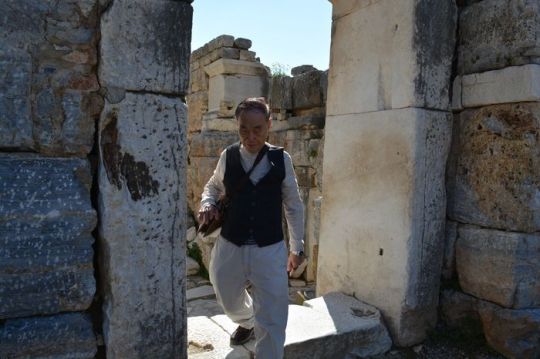
The civilised part of Europe
There were three schools in the place—one for girls and two for boys; and, to judge by the ruins which I saw, they were fine large buildings that no village of the same size, even in the civilised part of Europe, need have been ashamed of. There were six teachers in all—three male and three female; and the number of children that attended the schools was 680, of whom 500 were boys, and 180 girls.
The teachers were well paid—better, I think, everything considered, than they are in England, France, and Germany. The three male teachers and Raika received each sixty pounds a year, a sum which, in this country, where living is cheap, where no great expenditure is required in the way of dress, and in a mountain village far away from railways and telegraphs, was really a very comfortable income.
For a young girl like Raika especially, who had her home, it was a great deal of money. She applied half of it, however, to paying back to the literary society the money spent on her education. She soon became the head mistress of the girls’ school, and as she was the only one of the teachers who was a native of the village, she was a great favourite of the people.
Bulgarians voluntarily
It should be remembered that the schools in Bulgaria are supported by a kind of tax which the Bulgarians voluntarily levy upon themselves ; and the flourishing condition of the schools in one little place like this, and the way in which they were supported, will enable us to form an idea of what they are all over the country, and of the efforts these poor people are making to rise from the grovelling condition in which they have been held for so long. Raika’s position as schoolmistress in a place like Panagurishti was by no means an unenviable one Private Turkey Tours.
A schoolmistress in a place like this is a different sort of personage, it should be remembered, from a schoolmistress in London. With her cleverness, her education, her good looks, the esteem and respect in which she was held by everybody, her position was a very pleasant one, and she was in reality a sort of village queen.
I asked some of the people there if she had no sweet heart all this time, and what had become of him. They said there seemed to be nobody who aspired to her hand, for the reason that she was so far superior to the young men of the place, that they did not dare to hope for such a prize as she would have been. Poor girl; not one of the young men who then thought her so far above them would marry her now.
0 notes
Text
Power — The Compleat Analysis
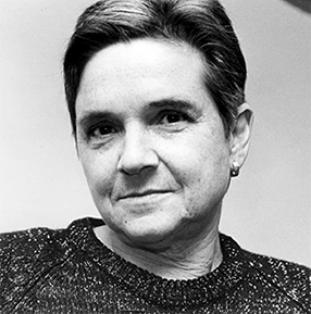
Though it is generally flattering for one to be the object of a poem — provided its sentiment is positive, of course — there are some rare poems which are so frightfully poor that their dedicatee can only be offended to be associated with them. The poem Power by Adrienne Rich is sadly of this kind; its lame lines manage only to dishonour the memory of the greatest scientist of all time — the late Madame Curie.
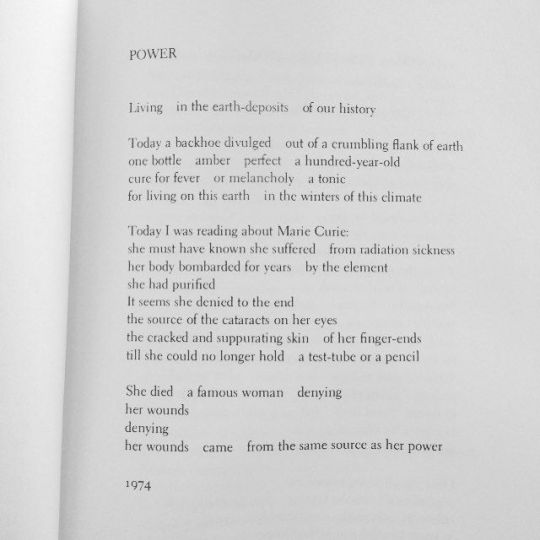
In the interest of impartial and complete consideration, we can begin with the praiseworthy aspects of the poem (this will not be a long paragraph). The idea of writing a poem about the underappreciated discoverer of radioactivity is in itself laudable. The link between power and vulnerability alluded to is important, even if it is not handled well. The poem is also rather short, which makes it more bearable — this, however, strikes me more as emptiness than as conciseness. We could finally add the alliteration of "body bombarded", were it not so clearly accidental.
Unfortunately, no amount of alliteration could save the poem from its unimpressive content. Leaving aside the more minor issues — such as the reference to a singular "element", when Marie Curie famously discovered two of them — Power fundamentally fails to be the feminist masterpiece it could have been under the pen of a better poet. Not only does Rich questionably portray Marie Curie as being in unscientific denial, the titular concept is perverted by claiming that Curie's power came from radiation:
She died a famous woman denying
her wounds
denying
her wounds came from the same source as her power
But this is clearly not true — her strength came from within, from her personality and willpower, from the mind that led to her outstanding scientific achievement. Claiming otherwise objectifies and dehumanises her in a disgustingly misogynist fashion. Adrienne Rich is the worst kind of pseudofeminist, one who pretends to fight for women's rights while obstructing equality and tolerance in a similar fashion to trans-exclusive "feminists".1
A stylistic and technical analysis of the poem sinks us even deeper into the pits of despair. Nevermind rhyme — we do not even get assonance, consonance or euphony to compensate for the rhythmic anarchy. Other than the meaningless line breaks and the even more pointless spacing, there is little to make this "poem" anything more than prose. The spaces are the most perplexing of all — in the first four-line stanza, they seem to indicate (logically) slight pauses, in a way similar to Emily Dickinson's dashes. In the rest of the poem, however, they make absolutely no sense — which casts doubt on whether they were even intended to have significance in that stanza. They do not even shape the pacing or slow lines down in any reasonable way. They seem to be nothing more than a failed attempt to make this literary scarecrow look more like 'a poem':
Living in the earth-deposits of our history
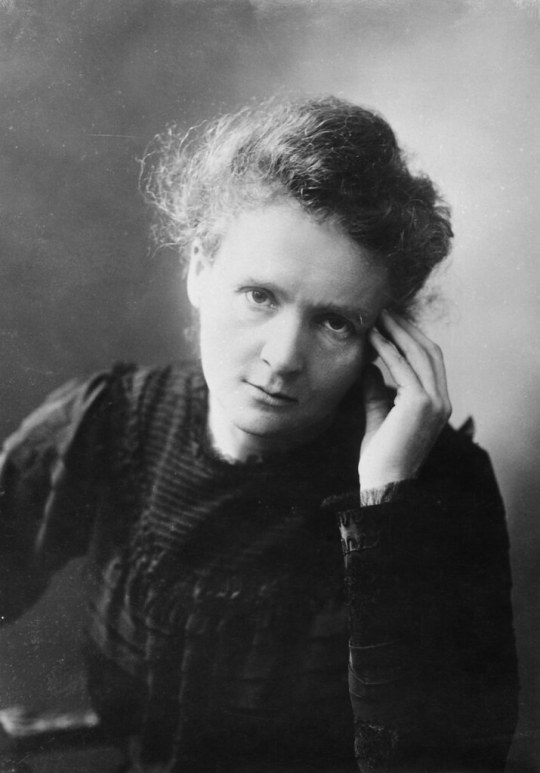
The fact that Marie Curie is no longer alive may make such tripe less harmful, but Power still infringes unacceptably on her memory. If anything, the lack of her worldly presence makes it all seem like we are gossiping behind her back. Adrienne Rich pretends to honour her and to support the struggle of feminism — perhaps she even believes to have done so in this poem — but what we ultimately receive serves only to offend and frustrate.
Marie Curie's remarkable achievements make her easily my favourite scientist. She discovered polonium and radium; she coined the term ‘radioactivity’; her inventions saved millions of lives. In a deeply sexist age, she became the first woman to win the Nobel Prize, and the first person — not the first woman, the first person — to win two Nobel Prizes. Yes, we should all write odes to her — but surely she deserves a better poem than this?
For a further discussion of such ideas, see my blessay on interpreting Elizabeth Bishop's Filling Station. ↩︎
16 notes
·
View notes